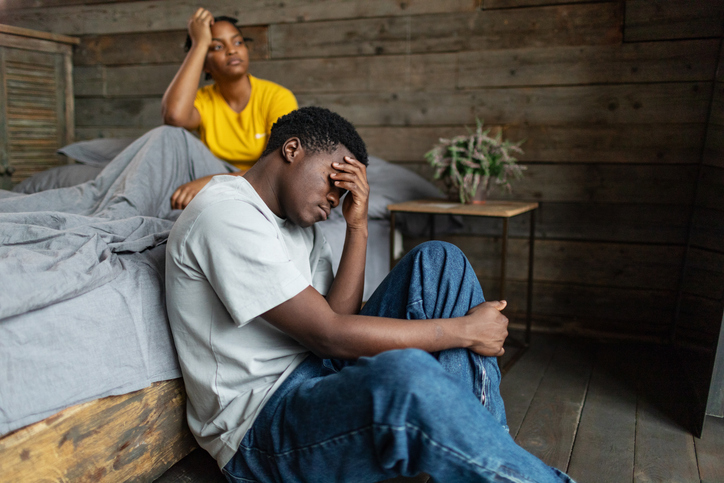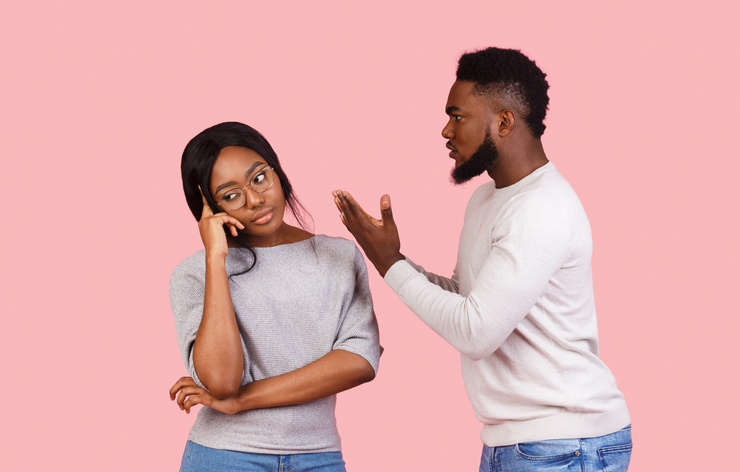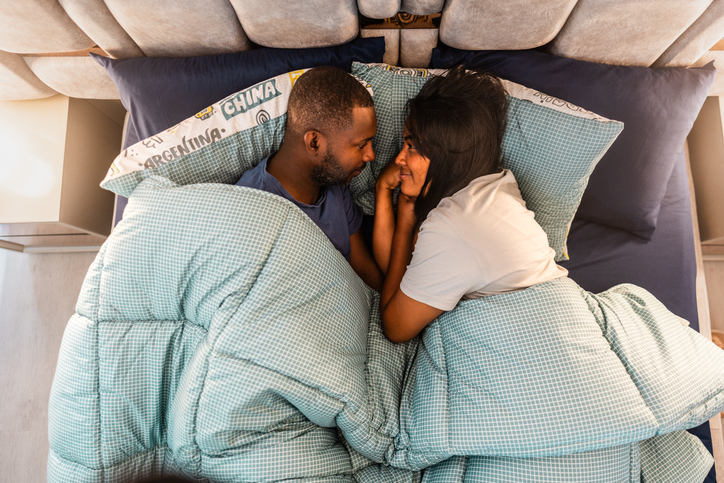5 Ways To Spot If You're Codependent On Your Partner
Clingy Or Connected? 5 Signs You Might Be Codependent On Your Partner
Share the post
Share this link via
Or copy link
Codependency can be damaging to a relationship, leading to feelings of suffocation and dissatisfaction, even in what could otherwise be a healthy partnership. If you find it difficult to create space between you and your partner, it may be a sign of codependency. Here are some signs to help you recognize when you and your loved one might be too codependent on each other, and tips for setting healthier boundaries to create a more balanced and lasting relationship.

1. Being alone makes you anxious or uneasy.
Do you feel anxious or uneasy when your partner makes plans without you? Instead of using the time apart to enjoy personal activities—like reading that book you’ve been meaning to finish or catching up with friends—you find yourself obsessively checking your phone, waiting for their return. Or perhaps you can’t enjoy group activities unless your partner is with you.
In some cases, your partner may subtly or overtly discourage your independence, using guilt to pull you closer: “You want to hang out with them but not with me?” or “Oh, so you’re ditching me?” This might also manifest as consistently canceling plans with friends to spend more time with your partner. Over time, you may find that you’re neglecting other relationships or missing opportunities to nurture your social circle out of fear that being busy will take you away from your partner.
Love MadameNoire? Get more! Join the MadameNoire Newsletter
We care about your data. See our privacy policy.
Clinical psychologist Coda Derrig, Ph.D., told Cleveland Clinic, that when we become increasingly enmeshed in our relationship, we’re no longer connecting with others outside of the relationship. Don’t let your relationship become all-consuming. In codependent dynamics, one person often ends up giving significantly more time, energy, and focus, while the other may unconsciously take advantage of this, prioritizing their needs over the balance of the relationship.
It’s important to create space between you and your partner. Maggie Dancel, a clinical psychologist at Hopefull Psychology in New York City, a healthy romance consists of independence allowing each partner to experience and nurture “their own life by spending time with friends or pursuing feel-good hobbies,” the health expert told SELF.
2. You feel responsible for their happiness.

In codependent relationships, one person often becomes the emotional center of the other’s universe. When your partner is happy, you feel secure; but when they’re upset or distant, it can send you into a spiral. According to Dr. Sabrina Romanoff, a New York City-based clinical psychologist, this emotional dependence can create an unhealthy dynamic where you feel it’s your job to make them happy, often neglecting your own well-being in the process.
To break this pattern, it’s essential to practice emotional self-regulation. Start by recognizing that your partner’s emotions are theirs to manage, and your happiness is not contingent upon theirs, Dr. Romanoff told SELF. Invest time in activities that bring you joy individually, whether that’s pursuing a hobby, reconnecting with friends, or focusing on personal growth. This way, you can build a stronger sense of self-worth independent of your partner’s emotional state.
3. You feel insecure or anxious when they don’t validate you enough.

If you find yourself obsessing over small signs of neglect—like your partner not responding to a text or failing to praise your accomplishments—it may be a sign that your self-worth has become too tied to your actions. Dr. Romanoff explains that constantly second-guessing yourself based on minor signs of neglect suggests your sense of validation comes from outside sources rather than from within.
To create independence, start by building internal validation by celebrating your achievements on your own. Forbes notes that you can eliminate negative thoughts by “naming and focusing on your good traits.” Practice self-affirmation techniques, such as listing your strengths or keeping a journal of your successes. The more you rely on your own validation, the less anxious you’ll feel when external validation is delayed.
4. You want to change who they are.

While it’s normal to have minor disagreements or preferences, a codependent person might try to change fundamental aspects of their partner’s personality or lifestyle. For example, you might want your partner to give up their social life to stay home more, or you might push them to change their core values or beliefs in the hopes of aligning more closely with your own.
A healthy relationship thrives on acceptance and mutual respect. Instead of trying to change your partner, break free from being codependent on your partner by focusing on understanding and appreciating the differences that make them unique. Allow each other space to be yourselves and pursue your individual interests. If differences become difficult to accept, consider whether you’re truly compatible in the long run.
5. You need their opinion before making the smallest decisions.

Do you find yourself constantly asking for your partner’s opinion before making even the simplest choices, such as what to wear or what to eat? While it’s natural to value your partner’s input, relying on them to make decisions for you can be a sign of codependency. Dr. Romanoff notes that when you start making choices just to match your partner’s preferences, you lose your sense of individuality.
To regain your independence, start making small decisions on your own. Pick an outfit without asking for their opinion, or order dinner based on what you want, not just what your partner prefers. Gradually practice making decisions that reflect your own tastes and desires, not just what aligns with your partner’s choices. This will help to make you less codependent on your loved one.
Building independence together

You can work together with your partner to become less dependent on one another. For example, instead of always having dinner together, try reserving some nights for your own activities—maybe Thursday nights for drinks with friends or a solo workout. Take a walk without texting them the whole time or attend social events independently. The goal is to nurture your individuality while keeping the romance alive by maintaining both personal interests and shared experiences.
Codependency often stems from deeper issues like low self-esteem or a fear of abandonment, which a therapist can help you address. With professional guidance, you can begin to understand the patterns that fuel codependency and replace them with healthier habits. Setting clear boundaries, nurturing your self-worth, and fostering independence within your relationship can help you and your partner create a more balanced and fulfilling dynamic.
RELATED CONTENT: The Hottest Sexual Fetish For 2025 Is An Absolute Shocker
-

Our Health, Our Power: Debunking Myths And Taking Charge This Open Enrollment
-

8 Famous Lesbian Women Who Were Married To Men
-

Bucket Baddies With Big Energy — The 30 Hottest NBA Players In The Game Right Now
-

Stacey Dash Turns 59—A Timeline Of Her Evolution From ’90s It Girl To One Of Hollywood’s Most Polarizing Figures



